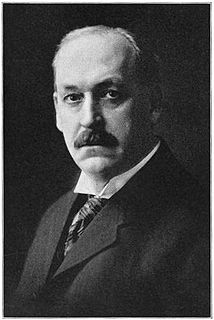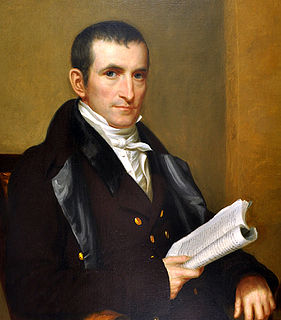Biography
Reuben Atwater was born in 1768, in Vermont, [1] the son of Reuben Attwater and Mary Russell. [2] He married Eliza Williard, and after her death married Sarah Lamb, daughter of General John Lamb. [2] Atwater had two children: Catharine Atwater and Clinton Edward Atwater. [3] Atwater was the Secretary of Michigan Territory from March 18, 1808, to October 15, 1814, [4] and was at the same time collector for the port of Detroit. [1] He directed the 1810 census of the Michigan Territory, [1] acted as Land Commissioner until 1811, and served as acting governor during the absence of Governor William Hull in 1811–12. [3] Atwater Street in Detroit was named after him. [5]

Vermont is a state in the New England region of the northeastern United States. It borders the U.S. states of Massachusetts to the south, New Hampshire to the east, New York to the west, and the Canadian province of Quebec to the north. Vermont is the second-smallest by population and the sixth-smallest by area of the 50 U.S. states. The state capital is Montpelier, the least populous state capital in the United States. The most populous city, Burlington, is the least populous city to be the most populous city in a state. As of 2015, Vermont was the leading producer of maple syrup in the United States. In crime statistics, it was ranked as the safest state in the country in 2016.

John Lamb (1735–1800) was an American soldier, politician, and Anti-Federalist organizer. During the American Revolutionary War he led the 2nd Continental Artillery Regiment.

Detroit is the largest and most populous city in the U.S. state of Michigan, the largest United States city on the United States–Canada border, and the seat of Wayne County. The municipality of Detroit had a 2017 estimated population of 673,104, making it the 23rd-most populous city in the United States. The metropolitan area, known as Metro Detroit, is home to 4.3 million people, making it the second-largest in the Midwest after the Chicago metropolitan area. Regarded as a major cultural center, Detroit is known for its contributions to music and as a repository for art, architecture and design.
Reuben Atwater died in 1831. [2]

Lewis Cass was an American military officer, politician, and statesman. He represented Michigan in the United States Senate and served in the Cabinets of two U.S. Presidents, Andrew Jackson and James Buchanan. He was also the 1848 Democratic presidential nominee and a leading spokesman for the Doctrine of Popular Sovereignty, which held that the people in each territory should decide whether to permit slavery.
Stanley Griswold was a Democratic-Republican politician from Ohio. He served in the U.S. Senate.

John Patton was the mayor of Detroit, Michigan in 1858-1859.

John R. Williams was an American soldier, merchant, and politician who is most well known for serving as the first mayor of Detroit, Michigan, after the city’s reincorporation. In total, he served as Detroit's mayor for five other terms. He also was a brigadier general in the United States Army during the Black Hawk War.

Asher B. Bates was a lawyer and politician in the United States state of Michigan and in the Kingdom of Hawaii.
Benjamin Franklin Hawkins Witherell was a jurist in the U.S. state of Michigan. He served as a justice of the Michigan Supreme Court in 1857.
John Griffin was an American judge. He was one of the original judges of the Supreme Court of Michigan Territory.

Clarence Monroe Burton was a Detroit lawyer and businessman, historian, and philanthropist.

Elijah Brush was a lawyer and politician from Detroit, Michigan.
Henry Jackson Hunt was a politician and businessman from Detroit, Michigan.

Levi Cook was an American business and politician who served two terms the mayor of Detroit, Michigan, and one in the Michigan House of Representatives.

De Garmo Jones was a businessman, state senator, and mayor of Detroit.

Henry Brockholst Ledyard, Sr. was the mayor of Detroit, Michigan and a state senator, briefly served as assistant secretary under Secretary of State Lewis Cass, and was the president of the Newport Hospital and the Redwood Library in Newport, Rhode Island.

Peter Desnoyers was a businessman and politician from Detroit, Michigan, and served as an early State Treasurer of Michigan.

Thomas Williams, originally from Albany, New York, settled in Detroit, Michigan in 1765. He married Cecile Chapeau from a prominent French-Canadian family that had settled in Michigan in 1710. Williams was a merchant, landowner, and was active in civic and political affairs. Goods were transported to Detroit from Albany via canoe, which could take a number of months for a round-trip. He petitioned for equitable opportunities to engage in trade at Fort Niagara and Detroit. In his role as justice of the peace, he was charged to uphold the law and punish those who were deemed to have broken the law. As notary, he executed legal documents for the settlement. He was also town crier and took the 1782 census. He married Cecile Campeau from a prominent family of French heritage who had come to Michigan about 1710. Cecile's brother, Joseph, was the state's first millionaire. Their son, John R. Williams, was the first mayor of Detroit.

Joseph Campau was among Detroit, Michigan's leading citizens and wealthiest landowners at the beginning of the 19th century. Campau had three trading posts and a store in Detroit until the early 1800s. He then embarked on a real estate career that made him very wealthy. Campau was also a newspaper man, establishing a newspaper with his nephew, John R. Williams. He held several city public offices for the city. Campau was an officer in the Michigan Territory Militia and during the War of 1812.

The Campau family of Detroit, Michigan was established when brothers Michel and Jacques Campau settled in Detroit, Michigan in 1707 and 1708, respectively. Jacques, Joseph Campau, and Barnabé Campau are among the Barons of Detroit, according to Richard R. Elliott, because they had "ancestral virtues most worthily perpetuated."
Antoine Dequindre (1781–1843) was a soldier, landowner and shopkeeper in Detroit, Michigan in the first half of the 19th century. He is best known for heroism at the Battle of Monguagon during the War of 1812, when he was serving as a captain in the Michigan Legion. Dequindre Road, which runs through Detroit as well as Oakland and Macomb counties, is named for him.
Charles Moran was an American businessman, jurist, and politician who served three terms in the Michigan House of Representatives. His family was prominent in early Detroit, and he is also related to the Campau and Dequindre families who were influential in the growth of the city.
















